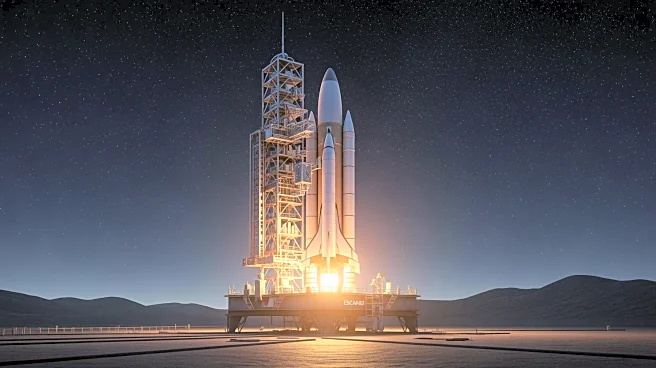What's Happening?
Blue Origin is set to launch its New Glenn rocket for the second time, carrying NASA's twin ESCAPADE spacecraft on a mission to Mars. The launch is scheduled for 2:45 p.m. ET from Cape Canaveral Space
Force Station. The ESCAPADE mission, led by the University of California, Berkeley, involves two small orbiters named 'Blue' and 'Gold' that will study Mars' magnetic environment and upper atmosphere. This mission aims to understand how Mars lost most of its atmosphere over time, which is crucial for planning future crewed missions to the planet. The spacecraft were built by Rocket Lab and will follow a unique trajectory, first heading to an Earth-Sun Lagrange region before slingshotting by Earth to reach Mars by 2027.
Why It's Important?
The launch of the ESCAPADE mission is significant for several reasons. It marks a milestone for Blue Origin as it attempts to recover the booster on a drone ship, a step towards routine reusability of its rockets. The mission also contributes to planetary science by providing insights into Mars' atmospheric loss, which is vital for future human exploration. Additionally, the launch occurs amid a federal government shutdown, highlighting the importance of maintaining space exploration efforts despite political challenges. The mission's success could pave the way for more cost-effective and innovative approaches to interplanetary exploration.
What's Next?
Following the launch, the ESCAPADE spacecraft will embark on a complex journey to Mars, with arrival expected in 2027. The mission will involve orbital trimming before the main science phase begins. Blue Origin's success in recovering the booster could lead to more frequent and cost-effective launches. The data collected by the ESCAPADE mission will be crucial for understanding Mars' climate evolution and preparing for future human missions. Stakeholders, including NASA and the scientific community, will closely monitor the mission's progress and outcomes.
Beyond the Headlines
The ESCAPADE mission represents a shift towards more collaborative and innovative space exploration efforts, involving partnerships between private companies like Blue Origin and academic institutions. The mission's unique trajectory highlights the potential for new approaches in space travel, which could reduce costs and increase efficiency. The insights gained from studying Mars' atmosphere could have broader implications for understanding planetary climates and the potential for life on other planets.










